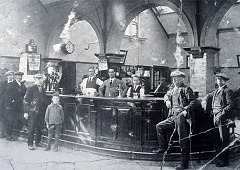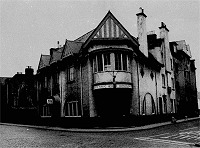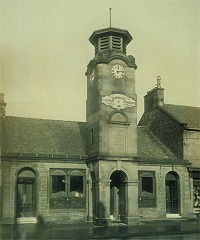Contents ![]() | The earliest public libraries
| The earliest public libraries ![]() | Learning organisations
| Learning organisations ![]()

Goths: Development in Scotland.
Several societies were set up to run public houses according to the Gothenburg system. Some were aided by coal companies. The 'Goths' of the mining communities of Kelty and Cowdenbeath in Fife, Newtongrange in Midlothian and East Whitburn in West Lothian are examples. Some were ambitious: the Dunfermline Public House Society was established in 1901 and by 1946 owned five public houses in Dunfermline. This society gave grants to local charities and sponsored sports events. Others adopted only part of the system: the term 'Disinterested Management' was used by a group of local miners to run a public house in Hill of Beath.

The Dalkeith Public House and Improvement Company ran the Black Bull Inn in Dalkeith, Midlothian. The company was set up in Edinburgh in 1904 by seven shareholders of varying employment. In accordance with Gothenburg principles, the dividend was to be limited to 5%, with any remaining profit used to benefit the community. In 1930 the original Articles of Association of the Company were rescinded and new Articles approved, although there appeared to be an intention to still give shareholders 5% and use the rest of the profits "towards objects of public or quasi public utility and well-being". However, some have said that there is no evidence of any benefits being provided to the community from the profits! In 2002 the Black Bull Inn was still being run as a public house.
The East of Scotland Public House Trust Company Limited was established in Edinburgh in 1901. It intended to acquire and build public houses that would be owned and managed on Gothenburg principles. The company acquired public houses in various parts of the country, e.g. Edinburgh, Ballingry and Culross in Fife and Prestonpans. The property acquired in Prestonpans is probably the best known of these buildings. The East of Scotland Public House Trust was taken over by the London-based Trust Houses Limited in 1919. In 1903 the 4th Earl Grey, who supported the use of the Gothenburg system, had established this trust. The temperance principles of this group remained in practice until it became part of the Trust House Forte Group in 1971.

Another trust came from within the community itself. Armadale Public House Society in West Lothian was begun in 1901 by raising funds through the sale of shares to members of the community and was run by a committee of male members of the community. In Armadale it was felt by some that by providing the funding for the local public house coal owners were exerting yet more control over their workers. There was a suspicion that intentions were not always purely altruistic, even although the profits were being used for their employees' benefit. Because of the investment and commitment made by members of the local community by purchasing shares, the Gothenburg pub in Armadale could claim to be truly owned and run by the community, although it was indeed a mining community.
In this section:
Schools of arts and the mechanics institutes | Working Men's Institutes | Trust public houses
Contents ![]() | Institutes of learning
| Institutes of learning ![]() | Learning organisations
| Learning organisations ![]()